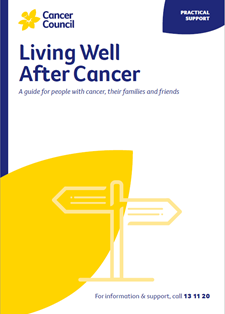- Home
- Cancer Information
- Living well
- Living well after cancer
- Adjusting to life after treatment
- Understanding your feelings
- Feeling down or depressed
Feeling down or depressed
It is common to feel low or depressed after treatment ends. Cancer survivors often experience worry or periods of feeling down for months or even years after treatment.
Learn more about:
- Overview
- Warning signs of depression
- Getting help with depression
- Video: Coping with emotions after a cancer diagnosis
Overview
Cancer survivors may feel sad or depressed because of the changes that cancer has caused, fear that the cancer will come back or worries about the future. Many people feel disconnected from their life before cancer. Others wonder if they will be able to work again and whether their family will cope if they can’t earn enough money. Sometimes you may feel down for no particular reason.
Support from family and friends, other cancer survivors or health professionals may help you manage these periods.
Warning signs of depression
At any stage after a cancer diagnosis, it is natural to have days when you feel sad or worried. Sometimes a person may begin to feel “stuck” in their distress and become depressed or anxious. Depression is more than feeling down for a few days.
Seek help from your general practitioner (GP) if you:
- find it difficult to function on a daily basis
- have lost the desire to do things that previously gave you pleasure
- feel very sad and low most of the day, nearly every day
- begin to rely on alcohol or drugs
- eat more or less than usual
- are sleeping too much or having a lot of trouble sleeping
- feel restless, agitated, worthless, guilty, anxious or upset
- think you are a burden to others
- worry that you might hurt someone
- think about self-harm or taking your own life.
Some of these symptoms can also be caused by other medical conditions. Talk to your doctor about how you are feeling and ask for help. Anxiety and depression are quite common among people who have had cancer, but there is no need to face this experience alone.
Although some people bounce right back, once treatment was over, I questioned my values and reasons for being here.
Emma
Getting help with depression
Depression generally won’t go away by itself – specific treatment is needed. Treating depression early may mean that you can deal with the problem quickly and avoid symptoms becoming worse.
There are ways to treat depression, which don’t necessarily involve medicines. Treatment may include therapy provided by a GP, psychologist, psychiatrist, social worker or counsellor. Some people are able to get a Medicare rebate for these sessions under a Mental Health Treatment Plan. Ask your GP if you are eligible. You can also call 13 11 20 to find out if your local Cancer Council runs a counselling program.
Some people find online programs or smartphone apps helpful in managing depression and anxiety. Examples include moodgym.com.au, mycompass.org.au or mentalhealthonline.org.au.
For information about coping with depression and anxiety, call Beyond Blue on 1300 22 4636 or visit. For 24-hour crisis support, call Lifeline 13 11 14. In addition to getting professional help, these tips may help you.
After my treatment, a psychologist explained that it’s common to feel like you’ve had the rug pulled out from underneath you after a major trauma. It’s also common to question your view of the world and your beliefs. Knowing that, and how normal it is, helped tremendously.
David
If you are having intense thoughts about hurting yourself or others, seek immediate assistance by calling Lifeline 13 11 14. In an emergency, call Triple Zero (000).
Video: Coping with emotions
More resources
Prof Michael Jefford, Medical Oncologist and Director, Australian Cancer Survivorship Centre, Peter MacCallum Cancer Centre, VIC; Lucy Bailey, Nurse Counsellor, Cancer Council Queensland; Philip Bullas, Consumer; Dr Kate Gunn, Clinical Psychologist and Senior Research Fellow, Department of Rural Health, University of South Australia, SA; Rosemerry Hodgkin, 13 11 20 Consultant, Cancer Council WA; Prof David Joske, Clinical Haematologist, Sir Charles Gairdner Hospital and Clinical Professor of Medicine, The University of Western Australia, WA; Kim Kerin-Ayres, Clinical Nurse Consultant, Cancer Survivorship, Concord Hospital, NSW; Sally Littlewood, Physiotherapist, Seymour Health, VIC; Georgina Lohse, Social Worker, GV Health,VIC; Melanie Moore, Exercise Physiologist and Clinical Supervisor, University of Canberra Cancer Wellness Clinic, ACT; June Savva, Senior Clinician Dietitian, Nutrition and Dietetics, Monash Cancer Centre, Monash Health, VIC; Dr Elysia Thornton-Benko, Specialist General Practitioner and Research Fellow, University of New South Wales, NSW; Prof Janette Vardy, Medical Oncologist, Concord Cancer Centre and Professor of Cancer Medicine, The University of Sydney, NSW; Lyndell Wills, Consumer.
View the Cancer Council NSW editorial policy.
View all publications or call 13 11 20 for free printed copies.
Need to talk?
Support services
Life after cancer treatment
Programs and support for people who have finished treatment
Cancer Council Online Community
A community forum – a safe place to share stories, get tips and connect with people who understand
Cancer information
Nutrition and cancer
How to eat well during and after cancer treatment
Staying healthy after treatment
Lifestyle changes that can help keep you in good health

